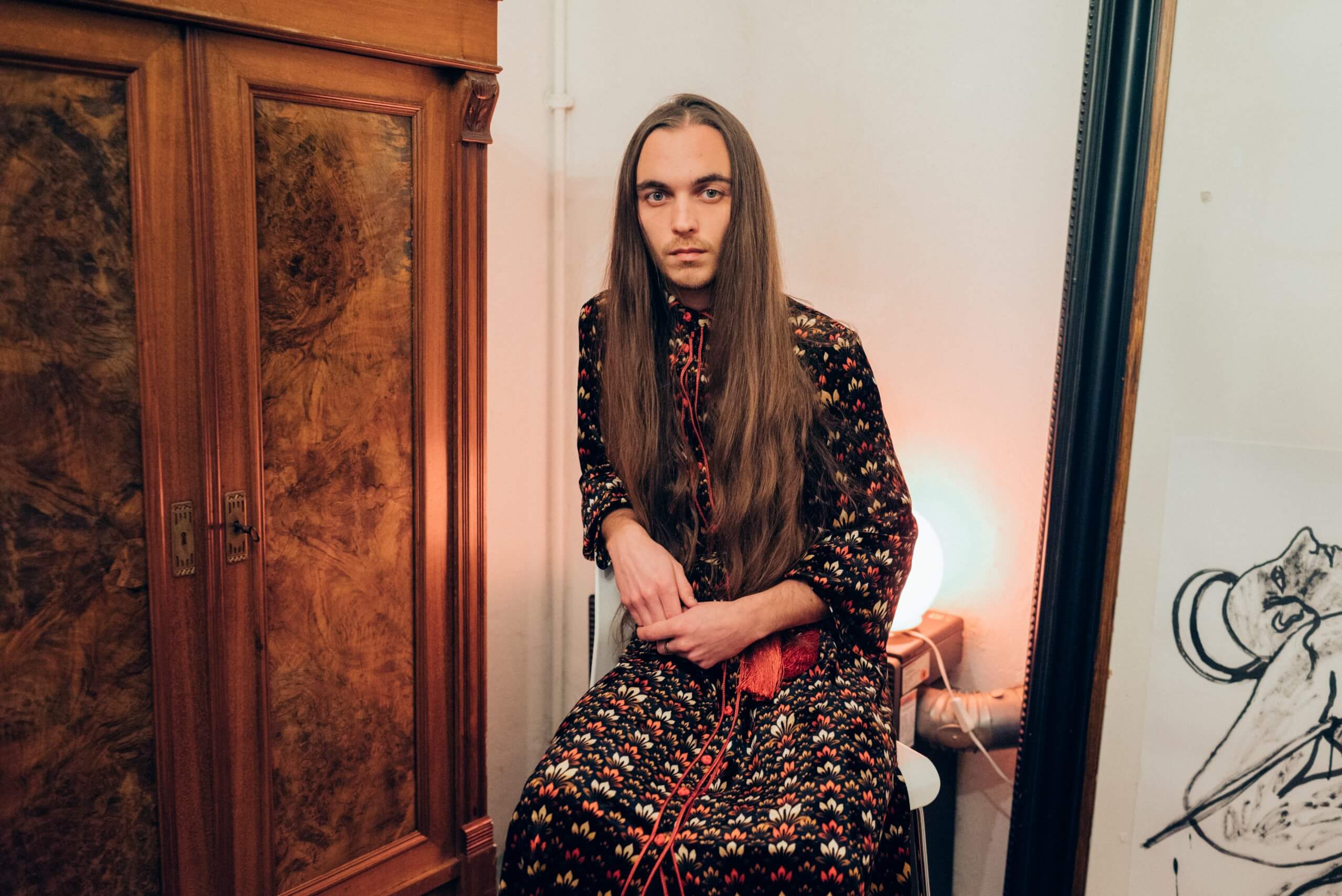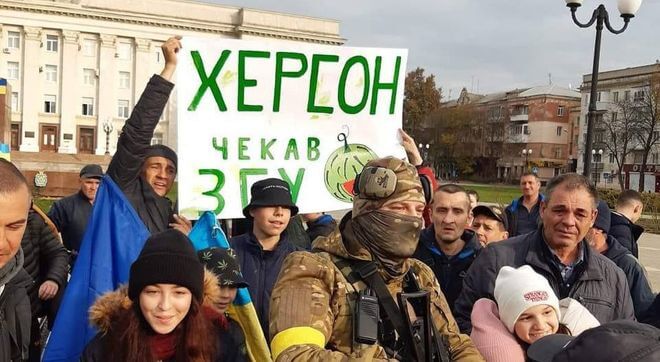“It’s not clear where you spread propaganda and where you teach.”
30-year-old Dmitry began teaching literature in one of the schools of Motovilikhinsky City District in the middle of last year. On the first day of work, a youth counsellor approached him and told him that in the seventh year group, where he was a homeroom teacher, there is a boy who has “feminine essence in a male body”.
When Dmitry first heard from the youth counsellor about Pavlik, he was very surprised and asked where this definition came from, what Olga Vasilyevna told him that the boy was diagnosed in a psychiatric clinic.
“Is it a disease?” the teacher asked.
“Yes, this is a deviation from the norm,” she replied.
Dmitry says that Olga Vasilyevna believes that “such children are very inconvenient, and they should be squeezed out of school.” She recommended that he write reports on Pasha’s bad behaviour on any occasion, and if he does not study well, “not to inflate his grades by giving him C’s, just F’s.”
The law on the prohibition of propaganda of non-traditional relationships among minors was passed in Russia in 2013. In the seven years that the law has been in force, it has been used about 15 times, the vast majority of those had political reasons.
An online magazine “Zvezda” found out how this law, which is “dead” from the legal point of view, actually led to self-censorship and fear of teachers in front of everything that concerns LGBT people, to gossips and anonymous reports on schoolchildren, and in some cases — discrimination against LGBT children, harassment and open aggression on the part of the teaching staff.
- The names of the teachers were changed because none of them agreed to speak openly for fear of losing their jobs or harming their students. The names of the children were changed in accordance with the law “On the protection of children from information harmful to their health and development”.

My main goal in creating the illustrations was to make them look as much like a child’s drawing as possible. When I read the article, an image of a rainbow instantly appeared in my mind.
The youth counsellor believes that such children will bring weapons and shoot half of the school.
Pavlik dyes his hair pink and comes to classes with a light makeup: he can put a little glitter on his eyebrows or lips. At school, his environment is okay about it and no one forbids him to wear makeup. “He has a peculiar behavior: active gestures, sensitivity, high voice. Someone would call him effected, I call it emotional,” says Dmitry.
After getting to know Pavlik better, Dmitry realized that the former does not feel dysphoria about his assigned sex, the boy considers himself a man and speaks about himself using the masculine gender. His mood swings and isolation, which Olga Vasilyevna complained about, are associated with a long conflict with his mother. She doesn’t like how Pavlik has changed: he’s become interested in makeup, subscribed to make-up bloggers, begun to wear make-up, take photos and post them on his social media accounts. She shouted at him, could even hit him, Pavlik replied, a fight began, his mother threatened to send him to an orphanage or a mental hospital.
“She calls him a “faggot”, and he calls her a “f*cking broke bitch”, that’s how they call each other. Then they fight, she throws him out of the house,” Dmitry explains. “He just can’t talk about it, and she’s pouring it all out onto me.”
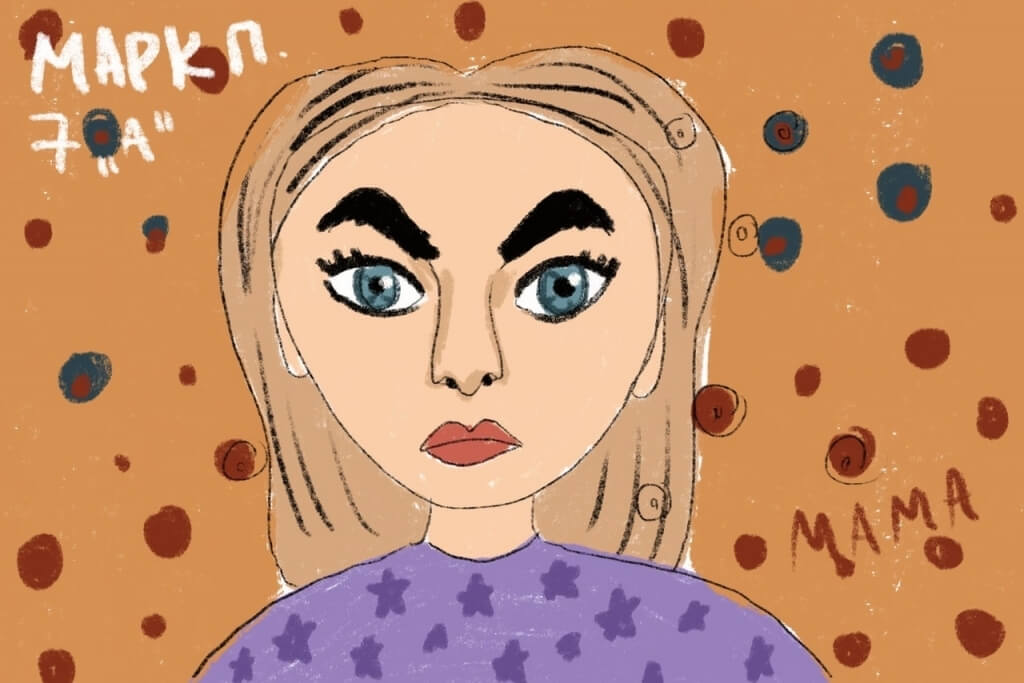
Pavlik receives no parental love, there are quarrels and swearing in their home, so the mother is angry, her eyebrows are lowered, her lips are curled in a grimace and the color scheme does not evoke warm feelings at all.
They always laughed at Pavlik in the staff room.
According to Dmitry, the school principal knows about the situation in the family and tries to support Pavlik, always asks how he is doing, the extracurricular work teacher protects and supervises him. “So I was surprised when I heard from a youth counsellor that Pavlik should not study at school.”
Pasha hardly talks to the guys in the class, but they do not offend him. He’s friends with the girls, and he attends handicraft lessons with them, too. At school, you can’t choose between handicrafts for girls and for boys, and Pavlik just breaks the rules. The handicrafts teacher is understanding, but not all teachers are like that.
“Young teachers treat LGBT people either neutrally or negatively: they are just concerned with not getting into trouble,” says Dmitry. ”They behave as if it doesn’t exist.” Among the older generation, I see extremely negative attitudes. In fact, they always laughed at Pavlik in the staff room: like, has he already made up his mind? This year, fortunately, this is no longer the case, because I did not encourage such jokes in any way.”
Psychologist Maria Naimushina conducted professional development courses for teachers and psychologists from 2013 to 2019. She says that due to the law banning non-traditional relationships among minors, since 2013, hatred of LGBT people has been promoted at the state level. “And while before this law someone had a chance not to know who LGBT people are and how to treat them, now everyone knows,” says Maria.
The psychologist believes that the law had a delayed effect, at first, it was known mainly in the activist environment. Teachers started asking questions only recently, a few years after the law came into force: “They ask something like this: Maria Vladimirovna, now our boys have begun to shave their temples and wear ponytails, does this mean that they will become gay?”
More advanced ones wonder what to do if one of the students looks or behaves like an LGBT person. The bravest ask how to talk to them. According to Maria, at best, teachers ignore an LGBT child (because of the opinion that any mention of LGBT is propaganda), at worst, they dislike them. This hostility manifests itself in the form of open aggression: “Well, what color did you dye your hair today, Ivanova?” or “And you, Smirnov, do you only dye your hair on your head?” Or in a passive form without referring to a particular person: “And all those ones, you know who, they must be sent to gas chambers.”
“I’m not even talking about discrimination, like not allowing trans guys and trans girls to use suitable bathrooms: there are cases when they are in school all day and they don’t use the toilet at all. Not because they don’t want to, but because if you go to boys’ one, you get beaten, and if you go to the girls’ one, you will be called to the principal.”
“A boy with pink hair is considered more dangerous than those who steal or do drugs”
In the fall of 2019, the school where Dmitry works, like all others in the Perm Krai, were equipped with a surveillance system for all children called “Trajectory”. You can’t find its site in the search engine, you can only log in with an individual username and password. The “Trajectory” is filled in by the homeroom teacher for each individual child, this way they identify children from risk groups, those who require special attention and support from the outside. For such children, an individual correction program (ICP) is drawn up.
“I saw that in Pavlik’s file, the youth counsellor wrote a note into the field on destructive groups: “Considers himself LGBT”, although there is no such category in the list of destructive groups. For me, this is a discriminatory practice, because, in addition to teachers, other agencies, such as the police or the Commission on Juvenile Affairs have access to the “Trajectory”.
Maria Naimushina says that school psychologists and youth counsellors are only technically bound by the ethical requirement of non-disclosure and confidentiality; they are put in a very uncomfortable position where, on the one hand, they must respect confidentiality, on the other hand, if something happens to a child, they will be to blame. As a result, a child’s particularities become known, at best, to a few people, at worst — to the whole school. The conflicts begin, the parents are called. Children are afraid to talk about themselves even to those adults who, in fact, can treat them appropriately.
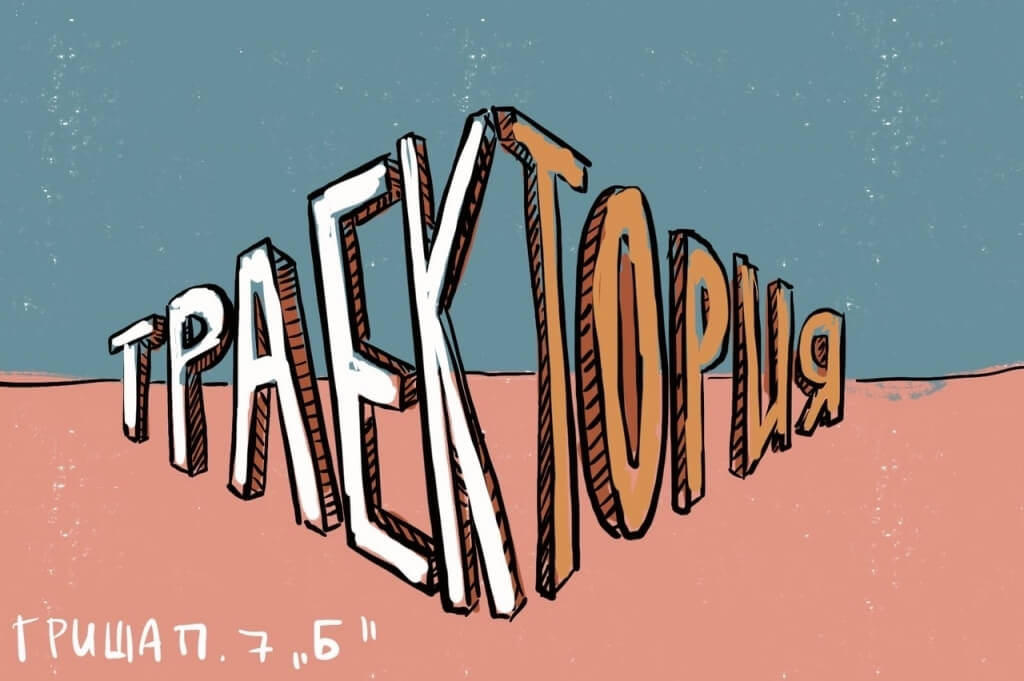
A classic exercise for learning perspective, it seems, but the pictured word “trajectory” brings us back to the reality that children have no choice and face discrimination.
The Ministry of Education of the Perm Krai reported that, first of all, the “Trajectory ” is needed in order to establish interaction between different governmental departments for the prevention and detection of child and family problems. Parents of children are not asked for permission to collect their data: the officials explained that this is not required. The teachers we interviewed confirmed that they are not allowed to tell parents about the system.
“I’m not against the “Trajectory”, but it’s not effective enough,” says one of the teachers. ”It seems to be created so that homeroom teachers won’t be told off. As soon as a child does something, they immediately check the “Trajectory”, and praise the teacher if this child already has indicators, then it means that the former was able to identify deviations, well done.”
Data on a child continues to be collected, even if they leave school after the ninth grade and apply to get secondary special education. If a child graduates after the 11th grade, their card is archived.
“In general, “Trajectory” looks like a useful initiative, because there was data collection before, but less centralized,” says lawyer Anna Plyusnina. ”Perhaps, this will really help identify children who are at risk. But you can only collect data and give access to it to other officials with the written consent of the child’s parents or representatives.”
Whether a youth counsellor’s record of Pavlik’s LGBT identity is legal depends on how this information is used further:
“If they call his parents and say, “Oh, how awful, make your child normal immediately“, then this is bad and illegal. If the information is used as one of the characteristics that a child can be bullied for, and additional positive attention will be given to such children, then perhaps this is good.”
Dmitry says that there are really troubled children at their school: children from very poor families who steal, children who smoke or do drugs. But the youth counsellor considers the boy with pink hair more dangerous than all of them. “He’s too strange, he stands out. Because those children steal something and then keep quiet, while he, supposedly, accumulates negative energy for a long time, and then he will slaughter everyone. The youth counsellor believes that such children eventually find guns, come to school and kill everyone. Therefore, Pavlik needs to be “squeezed out” of school, we need to create conditions where he cannot study. Therefore, it is good that he is given F’s, that he does not pass some tests, that he is not successful. What will happen next specifically with this boy, I can not imagine.”
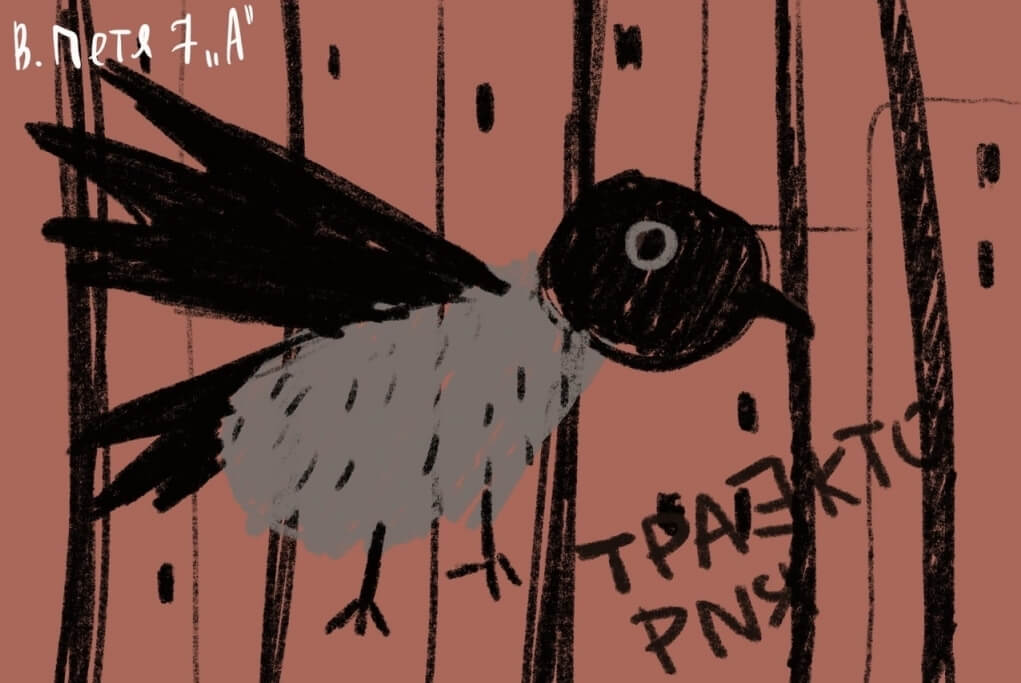
This illustration symbolizes the unfreedom that children, like little caged birds, face within the walls of the school.
Kids just want to hear the truth about what’s going on
Dmitry had never seen Pavlik being called names or bullied by his peers at school. Modern children, he says, have an acute desire to accept everyone. If five years ago, when Dmitry just started teaching, they could have beaten you for being different from others, now it’s the opposite. “I’m not like everyone else, and I’m OK with it” is a powerful trend among teenagers. At the beginning of 2020, Dmitry decided to ask his students what they themselves would like to learn in the classroom, because the curriculum, in his opinion, was not focused on the interests of children.
“One class told me that they were interested in the history of sexual minorities: how they lived before, how they live now.
I asked:
— Why are you interested?
They answered:
— Well, because no one tells us about it, and the information that can be found is most often biased and negative, and these are the same people as all of us.
And the children began to talk about the political situation in the world during a literature lesson. Why? This often happens when you have a trusting relationship with children. They just want you to tell them the truth about what’s going on. It doesn’t matter if it is related to your subject or not. For some reason, some parents believe that if you talk about it, then their child will become overly interested, and they will definitely become gay. As if it is some kind of disease. And children are just curious, they really appreciate when you honestly speak with them about something like this.”
Dmitry observes two trends at once: extreme everyday homophobia, which manifests itself in gossips in the teachers’ room and homophobic jokes among pupils, and at the same time a huge interest among schoolchildren not only in LGBT issues, but in sexual education in general.
“There is no sex ed, only hygiene lessons, where girls are told about pads, and boys — about deodorants,” says Dmitry. “At the end of the course, there are contests where boys can win a deodorant, and all girls receive pads. These contests are held separately, they believe that boys do not need to know about pads, and girls about deodorants. They don’t tell children about condoms, or family planning, or early pregnancy, or anything like that. It’s as if no one is having sex and we reproduce by budding.”
Dmitry plans to keep the promise, but has not yet decided how he will tell the children about LGBT people, most likely, “without diving deep into it, with a lot of limitations”: “I don’t know how they’re going to discuss it with their parents or other teachers,” he explains. ”The law about propaganda is very abstract. It’s not clear where you spread propaganda and where you teach. At school, LGBT people are secretly equated to marginal groups, they are not studied there.”
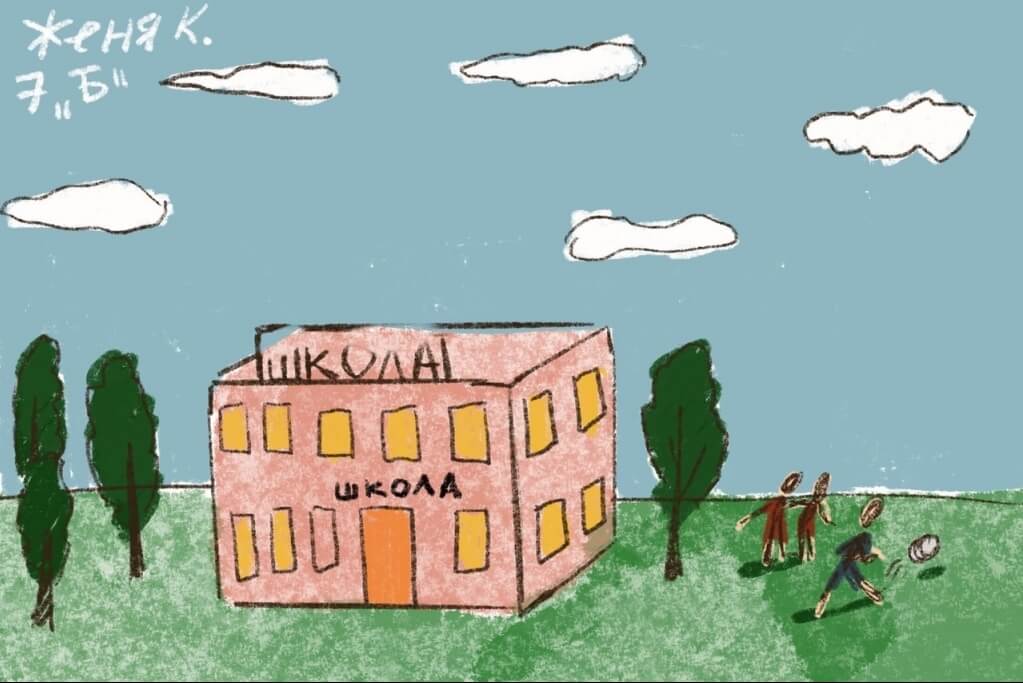
A luminous image of a school in which children have important and fun moments, a life in which they first encounter the most important events, the pleasant and the terrible.
According to the Resolution of the Constitutional Court of the Russian Federation of September 23, 2014 N 24-P, the prohibition of propaganda of non-traditional sexual relations among minors does not exclude providing relevant information in a neutral (educational, artistic, historical) context, explains Anna Plyusnina, a lawyer. Such information, if it is devoid of signs of propaganda, can be provided with the help of specialists: teachers, doctors, psychologists.
Thus, teachers have a right to talk to children about homosexuality, bisexuality, and transgender issues, but in a neutral context. This means that it is prohibited to give a positive or negative evaluation, to impose the information that may cause interest to such relations.
Psychologist Maria Naimushina agrees with the opinion of the lawyer, but would not advise teachers to conduct sex ed classes on LGBT people at school. The law itself is nonsensical, she says, because it does not explain what propaganda is and what non-traditional sexual relations are. “Is oral sex in a married couple a traditional or non-traditional relationship? In heterosexual? And in a homosexual one? Nothing is unclear in this law at all. It is basically not applicable to reality.”
Moreover, Maria says that the law contradicts scientific data, according to which for more than 20 years homosexuality and bisexuality have been considered as normal variants of sexual development; that is, one cannot be “infected” with them or “acquire them through propaganda”. In the new edition of the International Classification of Diseases (ICD-11), transsexualism is also excluded from the list of diseases. But it is considered a disease to want to “cure” one’s homo- or bisexuality.
An individual conversation, when a teacher talks privately with a student about what is happening to them, about their homosexuality, can not be considered propaganda. At the same time, the teacher should not say that “being gay is cool.” “I think that if they want to pick on a teacher, they can accuse them of propaganda and anything else for the words “being gay is normal”, the psychologist believes. ”I always say that this is your personal decision: whether you are ready to leave a child alone with their problem and be safe yourself. But at the same time, they will live with the fact that this child, for example, did something to themselves.”
“The girl” was such an excellent student, she had such a long braid, and now — what kind of freak is this?
Matvey, a ninth-grader, attempted suicide three times, but “never succeeded.” When asked what was the reason, he answers that the first time he had a fight with his mother and stepfather (they began to drink more often), the second time — because of a quarrel with friends, the third time “there was also something like that”. Matvey is a transgender guy, he lives with his mother and stepfather in the center of Perm, he studies at a gymnasium. “I get on more or less well with my mother, but we often fight with my stepfather. He thinks I have bad upbringing. At one time he called me a faggot, now he just shouts at me that I’m either a woman or a nobody for him.”
Matvey always communicated more with guys and fought with someone all the time: with sticks, with fists, most often alone against everybody. When he realized that he did not feel like a girl, he cut his hair and was very worried that his breast began to grow. Now, before leaving his house, he binds it with an elastic bandage. “At home, I tried to talk about myself without pronouns and other gendered language, so as not to give myself away. When my mother saw me without a braid, she started screaming that she gave birth to a girl.”
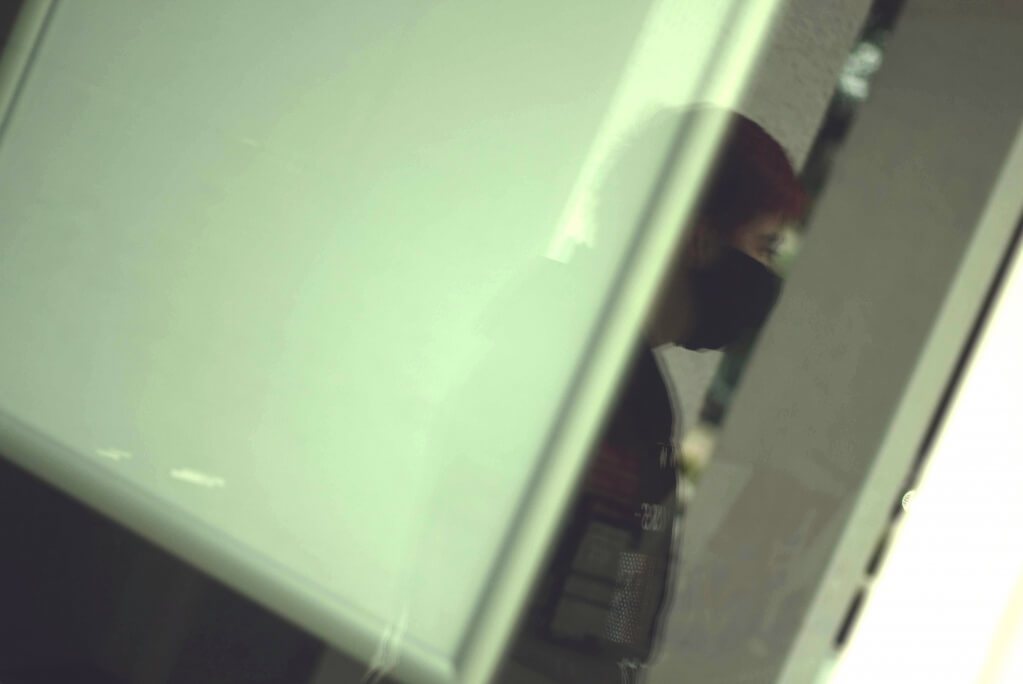
© Lera Tetereva
At school, no one bullies Matvey, high school students are indifferent to him. His friends, with whom he plays football, did not accept him at first, but he explained everything to them, and they began to use correct pronouns. A group of boys from a nearby school threatened to beat him up and “rape him to fix everything,” but it didn’t happen. “I’m walking in my neighborhood, and they start yelling at my back that I’m a lesbian, or I’d better be one, that I need to be fucked. They just yell, but don’t attack.”
Matvey says that he can stand up for himself, if it is necessary to fight, he can fight: “There’s no problem with that.”
A year ago, a new psychologist came to work at the school where Matvey is studying. Taya observes Matvey and has consulted him several times. She confirms that the guys from their school do not bully him, “they are friends and their interaction is rather calm”: Matvey changes clothes in the men’s locker room, he plays in the boys’ team, on his photos he’s always with boys. He talks with girls as well, even tries to flirt.
Only teachers bully Matvey, she says. The boy used to be a good student, he participated in various contests, “was representing his class” at creative competitions. And a few years ago, he changed a lot: he cut his hair, began to wear men’s jeans and hoodies, closed up and became aggressive. Surely, not all teachers liked it.
No propaganda here
“It’s scary to go into the teachers’ room,” Taya says. ”They (teachers), like fishwives, are constantly discussing him: what has become of “our girl”? “The girl” was such an excellent student, she had such a long braid, she graduated from a music school making straight A’s, and now — what kind of freak is this?
Teachers stop Matvey in corridors and have long conversations with him about how he should look like a girl, and in general come back to normal. “I don’t think they bully him, they’re just trying to put him on the right track.”
The homeroom teacher in high school, who teaches mathematics, continues to deadname Matvey. He says she doesn’t care, and she does it in front of everyone: “In addition, she constantly yells at us,” says Matvey. “She once told us that there are purely male and purely female activities, that sex before marriage is a sin. It was religious propaganda during a math class. She picks on me all the time, tells that I’m a girl and I have to behave like a girl.”
Taya witnessed another incident: Matvey was walking down the corridor during a class break, and an English teacher decided to say hello to him and shouted loudly: “Hello, Aigul!”
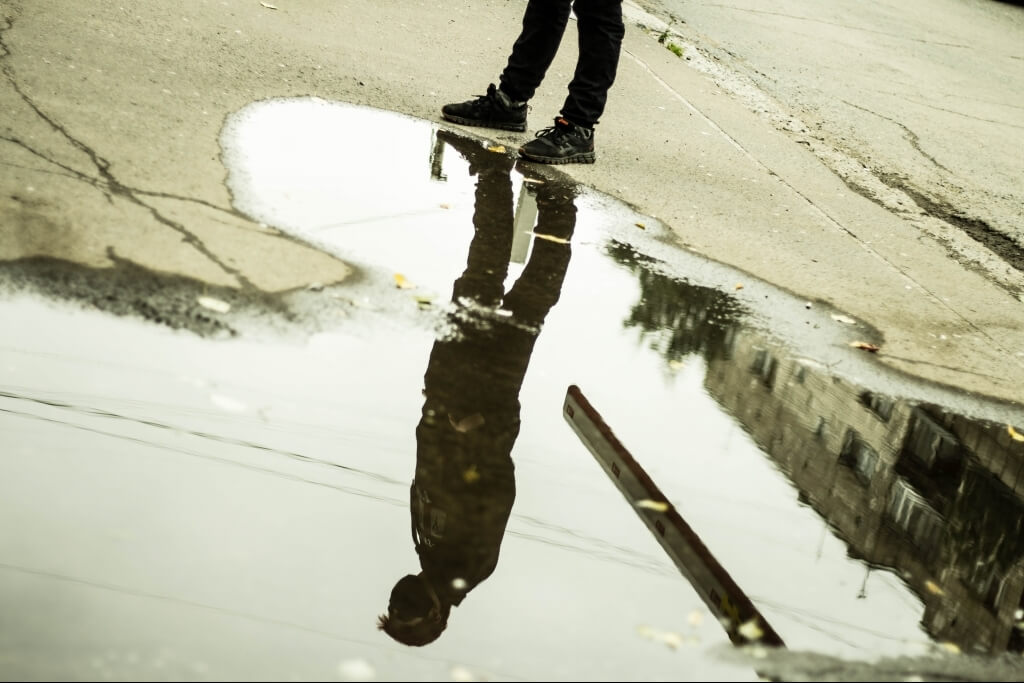
© Lera Tetereva
Matvey remembers this moment and believes that the teacher did it on purpose: she knows perfectly well that he asks everyone to address him by the name “Matvey”. When Taya tried to talk to those teachers who were transphobic towards Matvey or behaved inappropriately, she was stopped because there should be “no propaganda here anymore”.
A teacher from elementary school was the first to accept Matvey. The boy comes to her every break, helps her check pupils’ notebooks if she doesn’t have time. They drink coffee and talk a lot: “Once I explained everything to her, she said that for her this was a mental disorder, and it was hard for her to accept it. But she accepted it and now uses the right pronouns.”
The Health and Wellness teacher also treats Matvey as a man, shakes hands when they meet. Although, according to the boys’ stories, he often opposes LGBT people: “He may sometimes say homophobic things, but he’s not really homophobic. He explained that he didn’t care, as long as there were no gay pride parades.”
***
Matvey plans to leave school after the ninth grade and get a job at McDonald’s, where he worked part-time during summer holidays. He wants to move out from his parents and live separately. When he will have money, he plans to start taking hormones. While this article was not yet finished, the principle of the school where Matvey studies was replaced, and the psychologist Taya was fired because “she could not fulfill her responsibilities.” Now Taya is looking for a new job.
Pavlik continues to develop his make-up blog and draws comics. He hopes to become a stylist when he grows up. Dmitry tries to continue to support Pasha, according to him, the youth counsellor has so far left the boy alone and switched to other, “more troubled children”: someone from their school is suspected of distributing drugs.
Nothing beats good old email
For our monthly newsletter, we pick the most important news and analysis,
and add selected content and art from queer creators.
